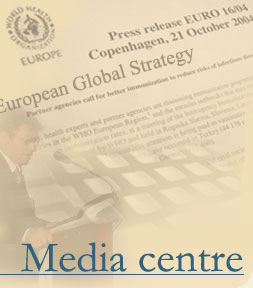WHO and the Open Society Institute / Soros foundations network agree to a collaborative framework for public health development
Copenhagen
To enhance their mutual impact on public health in Europe, the World Health Organization Regional Office for Europe (WHO/Europe) and the Open Society Institute (OSI) / Soros foundations network signed a memorandum of understanding this month outlining their intentions to cooperate in the development of public health infrastructures, workforce, information systems, policies and services, particularly in central and eastern Europe and the newly independent states.
The Open Society Institute / Soros foundations network is a private operating and grant making foundation that promotes the development of open societies around the world. Created and funded by the philanthropist George Soros, OSI is part of an informal network of more than 30 autonomous nonprofit foundations and other organizations in central and eastern Europe, the former Soviet Union, Guatemala, Haiti, and South Africa as well as in the United States, and seeks, inter alia, to encourage and support implementation of diverse health related projects, focussing on central and eastern Europe, to develop new approaches in public health and to identify and replicate successful initiatives.
"WHO/Europe and OSI have been working well together on a variety of projects over the last few years," notes Srdjan Matic, OSI Director of Public Health Programs. "This memorandum of understanding will give us an excellent framework within which we can better align our mutual strategies and significantly enhance our partnership."
Priority areas for collaboration include : · development of public health workforce; · development of schools and other public health educational institutions; · development of computer and Internet-based information systems for public health purposes; · development of rational, evidence-based health policies that promote efficient, equitable, and sustainable health action across sectors; and · support for the organized participation of citizens in the design, management, and oversight of health care systems, through non-governmental organizations and professional associations, in order to promote transparency, accountability, equity, quality of personal health care and public health services, and professional ethics in health care.
Specific areas of joint activities may include: · media and the promotion of public health; · health care systems reform; · infectious diseases control, including prevention, surveillance, design of services and policies, and with a particular focus on tuberculosis, HIV/AIDS and sexually transmitted infections; · reproductive health; · health in prisons; · mental health; · substance abuse; and · regional health policies and regulations.
"We welcome the strengthening of our partnership with OSI. It is a strong practical expression of the WHO's new country strategy, 'matching services to needs', adopted by ministerial delegations from the 50 active Member States at the Regional Committee held this month in Copenhagen," stated Dr Marc Danzon, WHO Regional Director for Europe. "It will allow both organizations to make better use of scarce resources and have a greater impact on public health."
For more information, contact:
|
|

